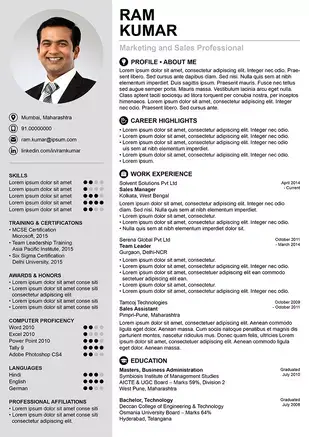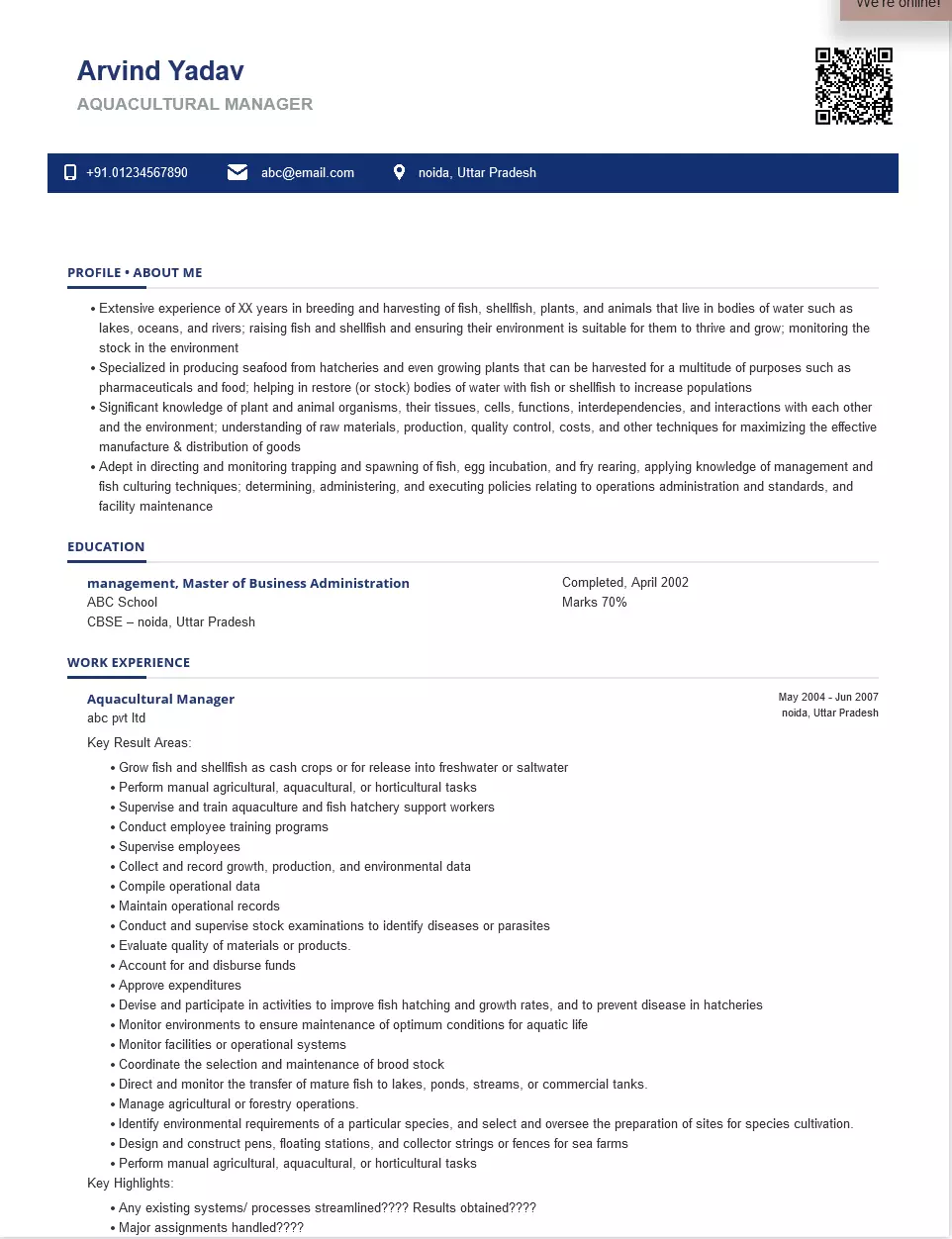- Certification in Aquaculture Program, Completed , January 2013
What's your job?
Aquacultural Manager Resume Samples and Templates for 2026
- Table of Contents
- Downloadable Sample
- Resume Tips from Experts
- Resume Text Version
- Share
Crafting the Perfect Aquacultural Manager Resume: A Step-by-Step Guide
If you’re passionate about aquaculture, managing sustainable farming systems, and ensuring healthy fish populations, then crafting an Aquacultural Manager Resume that stands out is key to landing your dream farm manager position. A well-structured and optimized resume not only showcases your skills and experience but also ensures it passes ATS scans and catches the attention of a hiring manager.
Below is a complete guide to help you create an impressive aquaculture farm manager resume—from choosing the right resume format to writing a professional resume summary that highlights your expertise in fish health management, water quality, and sustainable aquaculture practices.
Understanding the Role of an Aquacultural Manager
An Aquacultural Manager is responsible for overseeing farm management operations, ensuring fish health, optimizing water quality, and implementing sustainable aquaculture systems. This position requires a deep understanding of aquaculture, farm management software, and recirculating aquaculture systems (RAS).
Whether you’re applying for a small aquaculture farm manager job or a large-scale commercial operation, your resume should highlight your ability to develop and implement sustainable aquaculture practices, manage staff, monitor fish growth rates, and ensure compliance with industry standards set by organizations like the National Aquaculture Association or the World Aquaculture Society.
Step 1: Choose the Right Resume Format
Selecting an effective resume format sets the tone for your application. For most farm manager resumes, the reverse chronological resume format works best because it emphasizes your work experience and career progression.
If you’re transitioning from another role or have a diverse background, consider a functional resume that focuses on your skills in aquaculture, farm management, and sustainable fish production.
You can also start with a free resume template or use an online resume builder to simplify the process and ensure your layout is clean, professional, and easy to read.
Step 2: Write a Compelling Resume Summary
Your resume summary appears at the top of your resume and serves as your first impression. It should briefly summarize your years of experience, key achievements, and areas of expertise in aquaculture and farm management.
Example Resume Summary:
“Experienced Aquaculture Farm Manager with over 10 years of experience in managing fish production, ensuring optimal water quality, and implementing recirculating aquaculture systems. Proven track record in developing sustainable aquaculture practices, leading a team of 20 aquaculture professionals, and achieving award-winning results recognized by the World Aquaculture Society.”
A strong resume summary helps ensure your resume gets noticed by hiring managers and clearly demonstrates your qualifications for the farm manager job.
Step 3: Highlight Your Work Experience
The experience section is where you showcase your professional achievements and responsibilities. Use bullet points to make this section easy to scan.
Example:
Aquaculture Farm Manager – BlueSea Farms, Kerala June 2016 – Present
Implemented sustainable aquaculture practices to improve fish health and growth rates by 25%.
Managed farm operations across a recirculating aquaculture system (RAS) with 10+ production units.
Supervised a team of 20 aquaculture technicians, ensuring proper farm management and water quality monitoring.
Introduced farm management software to streamline reporting and reduce manual tasks by 40%.
Achieved a National Aquaculture Association recognition for outstanding farm management.
Each bullet should focus on measurable results, achievements, or initiatives you implemented that demonstrate your ability to lead and innovate in the aquaculture sector.
Step 4: Emphasize Education and Certifications
Include your bachelor’s degree in aquaculture or a related field, along with any relevant certifications such as:
- Certification in Fish Health Management
- Training in Recirculating Aquaculture Systems (RAS)
- Sustainable Aquaculture Practices accreditation
Highlighting your qualifications proves your technical expertise and commitment to advancing your career in farm management.
Step 5: Showcase Key Skills and Competencies
Your skills section should reflect your technical skill set and soft skills relevant to aquaculture management.
Key Skills to Include on Your Resume:
Fish Health and Growth Management
Water Quality Monitoring
Recirculating Aquaculture Systems (RAS)
Farm Management Software
Sustainable Aquaculture Practices
Team Leadership and Supervision
Farm Operations Optimization
Budgeting and Resource Allocation
Data-Driven Farm Reporting
These skills help your resume stand out to employers looking for experienced aquaculture professionals capable of managing complex operations.
Step 6: Tailor Your Resume to Each Job Application
A winning resume is one that’s customized for each farm manager position you apply for. Tailor your resume by aligning your skills, experience, and achievements with the job description.
Remember to optimize your resume for ATS systems by including relevant aquaculture-related keywords, such as “fish health,” “water quality,” and “sustainable aquaculture.”
Step 7: Add a Strong Cover Letter
Your cover letter should complement your resume by providing more context about your career goals, achievements, and passion for aquaculture. Use it to show why you’re the ideal candidate and how your proven track record can contribute to the employer’s farm management success.
Step 8: Proofread and Finalize Your Resume
Before submitting your job application, proofread your resume to eliminate errors and ensure clarity. A well-designed resume with a polished layout reflects professionalism and attention to detail—qualities highly valued in the aquaculture sector.
You can use an online resume builder to create a professional resume in minutes, complete with formatting options and resume examples and templates tailored to aquaculture farm managers.
Final Thoughts
A strong Aquacultural Manager Resume showcases your ability to lead, innovate, and maintain sustainable fish farming operations. Use the right resume format, emphasize measurable achievements, and highlight your expertise in fish health management and recirculating aquaculture systems.
With the right approach and a resume that effectively demonstrates your experience, you can craft a job-winning resume that helps you stand out in the growing aquaculture industry and land your next farm manager role with confidence.
Frequently Asked Questions
What should I include in an Aquacultural Manager resume?
Your resume should clearly show your professional summary, relevant work experience managing aquaculture operations, key technical and leadership skills (like water quality control, fish health monitoring, and team supervision), plus education and certifications that prove your expertise. Tailoring it to the specific job description can make a big difference.
How do I write a strong professional summary for this role?
Keep it focused and specific: mention your years of experience in aquaculture management, highlight key strengths like optimizing farm productivity or sustainable practices, and include measurable outcomes you've delivered.
What skills are most important for an Aquacultural Manager resume?
Employers look for a mix of hard and soft skills. Hard skills include fish health and growth management, water quality monitoring, and use of aquaculture technology. Soft skills like leadership, critical thinking, and communication are equally valuable.
Should I list certifications or specialized training?
Yes — listing certifications (for example in aquaculture systems, water quality management, or sustainable farming) shows commitment to your field and can set you apart from other candidates.
How do I make my resume ATS-friendly?
Use clear section headings like Work Experience, Skills, and Education, and include relevant keywords from the job posting such as "recirculating aquaculture systems," "fish health," and "environmental compliance." Avoid overly fancy formatting that applicant tracking systems might not read correctly.
What are common mistakes to avoid on this resume?
Avoid long paragraphs describing duties without results, generic summaries that don't highlight your strengths, and unrelated skills that don't speak to aquaculture management. Focus on measurable achievements.
How long should an Aquacultural Manager resume be?
Aim for one page if you're early in your career, and up to two pages if you have extensive experience — but make sure everything you include adds real value.
What kinds of jobs can I target with this resume?
With the right resume, you can apply for roles like Aquaculture Farm Manager, Hatchery Manager, Shellfish Farm Supervisor, or Director of Aquaculture Operations — depending on your experience and skills.
Do I need a degree for this role?
Many employers prefer a bachelor's degree in aquaculture, marine biology, fisheries science, or a related field, and hands-on experience in aquaculture settings strengthens your resume.
How can I highlight leadership in my resume?
Use bullet points to show specific ways you supervised teams, trained staff, implemented process improvements, or led sustainability initiatives — and whenever possible, tie them to measurable outcomes.
Aquacultural Manager Text-Only Resume Templates and Samples
Arvind Yadav
Phone: 01234567890
Email: abc@email.com
Address: sec-44, Noida, noida
About Me
AQUACULTURAL MANAGER
- An Accomplished Aquacultural Manager Skilled in directing and coordinating, through subordinate supervisory personnel, activities of workers engaged in fish hatchery production for corporations, cooperatives, or other owners
- Extensive experience of XX years in breeding and harvesting of fish, shellfish, plants, and animals that live in bodies of water such as lakes, oceans, and rivers; raising fish and shellfish and ensuring their environment is suitable for them to thrive and grow; monitoring the stock in the environment
- Specialized in producing seafood from hatcheries and even growing plants that can be harvested for a multitude of purposes such as pharmaceuticals and food; helping in restore (or stock) bodies of water with fish or shellfish to increase populations
- Significant knowledge of plant and animal organisms, their tissues, cells, functions, interdependencies, and interactions with each other and the environment; understanding of raw materials, production, quality control, costs, and other techniques for maximizing the effective manufacture & distribution of goods
- Adept in directing and monitoring trapping and spawning of fish, egg incubation, and fry rearing, applying knowledge of management and fish culturing techniques; determining, administering, and executing policies relating to operations administration and standards, and facility maintenance
Education
Arts and Design, Master of Arts, Completed, April 2007
DAV College of Education.
– Marks 70
Noida, UP
Certifications
Work Experience
Period: May 2010 - Current
Aquacultural Manager
Centre For Aquatic Livelihood Jaljeevika
- Grow fish and shellfish as cash crops or for release into freshwater or saltwater
- Perform manual agricultural, aquacultural, or horticultural tasks
- Supervise and train aquaculture and fish hatchery support workers
- Conduct employee training programs
- Supervise employees, collect and record growth, production, and environmental data
- Compile operational data maintain operational records
- Conduct and supervise stock examinations to identify diseases or parasites
- Evaluate the quality of materials or products.
- Account for and disburse funds
- Approve expenditures
- Devise and participate in activities to improve fish hatching and growth rates, and to prevent disease in hatcheries
- Monitor environments to ensure the maintenance of optimum conditions for aquatic life
- Monitor facilities or operational systems
- Coordinate the selection and maintenance of broodstock
- Direct and monitor the transfer of mature fish to lakes, ponds, streams, or commercial tanks.
- Manage agricultural or forestry operations.
- Identify environmental requirements of a particular species, and select and oversee the preparation of sites for species cultivation.
- Design and construct pens, floating stations, and collector strings or fences for sea farms
- Perform manual agricultural, aquacultural, or horticultural tasks
Period: January 2008 - October 2010
Aquacultural Manager
OMICS International Conference
- Managed the overall operation of a fish hatchery, fish farm, or other aquatic farms
- Identified requirements of the species and selected and oversaw the preparation of the site for species cultivation
- Co-ordinated selection and maintenance of broodstock
- Determined food requirements and structure feeding regimes
- Conducted and supervised stock examinations to identify diseases or parasites, and applied prescribed medicinal substances to control and prevent infection
- Operated and maintained cultivating and harvesting equipment
- Collected and recorded growth and production data
- Managed and trained aquaculture and fish hatchery support workers and supervised technicians and technologists; monitored environment and maintained optimum conditions
- Maintained financial records and established market strategies, inventory, and quality control methods
Skills
- Fish farm operations
- Fish Health and Welfare
- Hatchery operations and production
- Shellfish operations and production
- Health and safety for the production environment
- Communication
- Management
Languages
Softwares
Operating System
Personal Interests
- Fishing
- Trekking
- Swimming
 India's
premier resume service
India's
premier resume service





